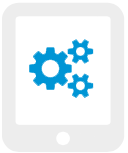
Managing Through COVID-19
For leaders everywhere, Covid-19 is a world-changing event that comes with a barrage of news, but a lack of answers. In the face of significant and unexpected challenges, it’s more important than ever for people to come together, lift each other up, and help in any way they can. With this in mind, we spoke to the CEO of Sparxoo, David Capece, about his experience in managing through COVID-19.
“It was really challenging initially, because nobody has faced a pandemic before,” David says. “And back in March, the magnitude of Covid-19 was unclear. Every day, the national conversation and CDC guidelines were shifting quickly. So it was a moving target in terms of what we were even going to face. The degree of uncertainty was something I have never faced. That was the biggest challenge.”
So, as the leader of a company, the visionary who sets course quarter after quarter for innovation and growth — how do you lead blind? How can you plan for the unimaginable?
David took Sparxoo back to the basics. “The world of 2019 was a world focused on growth and innovation,” David says. “When the pandemic hit, it was all about strengthening the core, and ensuring that you’re amazing at those things you should be amazing at.”
In the aftershock of a global pandemic, even strengthening your core might sound daunting — so focus on relationships.
“We got really close to our customers and our clients,” David says. “We spent more time in conversation with them to understand their situation, to understand their wants and needs, and how those were shifting. We wanted to understand what was happening in the context of their business, what was important to them and how to move the needle for them. We were in lockstep with our clients — we were able to stay true to our core, but also evolved with our them. It’s more important than ever to be close to your customer so you ensure that you can anticipate where they’re going and how to serve them.”
Not only does relationship building help with aligning you and your clients — it’s also an essential focus internally on your team. “We had a high degree of transparency in our over-communication,” David says. “Relationships are more important, because in a remote world, you still need to be able to build trust. I think because we’re a small team, there’s an increased sense of camaraderie amongst team members.”
When it comes to team building, a mix of consistency and innovation helps keep everyone engaged. “We set up a regular cadence for when the entire agency gets together,” David says. “Then we set daily stand-ups for smaller teams to bring those groups together. We also had a special happy hour, which was as simple as getting an UberEats gift card for each team member, unboxing the meals we selected over video, and playing Pictionary. We’re eagerly anticipating our next event: the Xoo Virtual Tailgate. It’s about finding new ways to bond, engage, and share culture.”
Beyond the cadence and content of meetings, David also recommends keeping them face-to-face. “We emphasize the use of video in all of our meetings. Some companies don’t and I think it’s a mistake.”
Inevitably, there have been challenges to face with the onslaught of COVID. “You were operating in a vacuum of darkness in the sense that you couldn’t ask for advice,” David says. “Everyone was going through it simultaneously. The world had gone quiet with everyone figuring out how to wade through.” Beyond bottom line questions of how to remain in operation, established protocols had to be re-examined in the face of COVID’s impacts.
“Managing through COVID has required more speed, agility, flexibility, and adaptation,” David says. “Some of the structures that we had in place had to be torn down, because they either were complicated, or they didn’t necessarily work in a remote, fast-moving environment. Any time you want to try to scale a business, you want to build repeatable processes — but they aren’t fully valid in this new environment, so we’ve had to change them.”
Everything from on-boarding to remote work policies needed to be addressed, sometimes in step with putting new procedures into action. “We had rules in place before that may not need to be rules anymore ,” David says. “For example, we’d allow team members to go remote, but only after they were in person for six months. Now, nobody can be in person, so we’ve on-boarded team members remotely from New York to Austin to Minneapolis. We’ve even brought on team members who have no intent to be in Tampa Bay. That has opened up a full set of opportunities in terms of applicant pools for new positions. Meeting in person may not be as critical as we’ve thought.”
Ultimately, David shares that one of the most important learnings he’s come to through this time has been the importance of a strong foundation — which, in the case of Sparxoo, means a diverse portfolio of clientele. “Part of our transition through COVID was that we had a portfolio of businesses, capabilities, and initiatives, and it was diversified enough so that impacts have hit differently. Some of our capabilities are more demanded, some are less; some clients are more affected, some less. Because we had this diversification, we were able to navigate through the crisis and shift.” By setting a strong business foundation, you have more stable footing when crises arise.
Not everyone is in that same stable position, though, and so David’s final take-away from COVID is to help when you can, how you can. “When we had some excess capacity, we gave back to the community to Feeding Tampa Bay, the City of Tampa, and others,” he says. “We used the sudden bandwidth to not just sit idle. There’s always something you can do to give back to the community.” In the end, our humanity helps us survive — and pull others through with us.
To learn more about Sparxoo and it’s team, please visit www.sparxoo.com.
Categorized in: Work
This post was written by Elevate, Inc.




Comments are closed here.